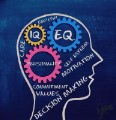Executive Corner – Afraid of AI? Become a Leader
Michael Clegg | 08/09/2023
The era of artificial intelligence (AI) has brought about remarkable advancements and transformations across industries. It’s made tasks easier (or thoughtless), with the incorporation of automation and it has made strides in increased efficiency and innovation. However, it has also triggered concerns about the potential displacement of human workers.
Remember during the pandemic when there was push toward self-checkout (depending on the store)?
The initial intention of this shift was to limit person-to-person contact to decrease the chances of getting the virus. Well, here we are, years later, and it seems like whenever I walk into a store, there aren’t any cashiers to be found! There’s one person managing 4, 6, or maybe 8 self-checkout registers in most large retailers. Even in McDonald’s and Taco Bell, you walk in and there’s a tablet that you have to use to place your order.
Maybe that’s to cut costs or maybe that’s due to a decrease in the number of people who are willing to work for a cashier’s pay. Either way, the point is that there’s only one person “managing” or “leading” in this equation who avoided getting the boot.
Similar to that, maybe that’s what we’ve got to do to avoid getting booted by AI.
In this landscape, leadership seems to stand as a resilient shield against the threat of AI replacing human roles. Aspiring leaders can leverage their unique human skills to not only stay relevant but also thrive in the AI-powered world.
So, why are some Afraid of AI?
For starters, Job displacement is one of the top reasons for fear of AI. Automation takes over tasks traditionally performed by humans, leading to the elimination of certain job roles. As AI becomes more advanced, it has the capacity to perform repetitive and routine tasks with greater efficiency and accuracy than humans. Industries that heavily rely on such tasks, such as manufacturing, data entry, and customer service, are particularly susceptible to this form of job disruption.
This fear is not unfounded, as various studies and reports suggest that AI and automation could result in significant job losses over the coming decades. This situation can be especially concerning for workers who lack the necessary skills to transition into other roles that require uniquely human capabilities, such as creativity, emotional intelligence, and problem-solving.
To ease your fear for just a moment, note that there are alternatives to being outright replaced. For example, Jacob Morgan outlines a section in his book The Future Leader that automating jobs doesn’t call for termination of human workers in every case. The company Accenture “automated over 17,000 employees yet didn’t replace a single worker”. Instead, they invested in those employees by upskilling them for better positions and left the number-crunching jobs to the computers. Not so bad, right?
The rapid advancement of AI technology contributes to a sense of uncertainty among employees about the future job market. The pace of technological progress is difficult to predict accurately, making it challenging for workers to anticipate which job roles will be affected and when these changes might occur. This uncertainty can cause anxiety and stress among employees, as they grapple with the unknown. It may also hinder career planning and decision-making, as employees are unsure about the viability of their current career paths in the face of AI disruption.
There are concerns that AI could exacerbate economic inequality, with the benefits of increased productivity and cost savings disproportionately benefiting business owners and top executives. Meanwhile, workers may face the brunt of job losses.
Fear also arises from potential ethical issues related to AI use, such as compromising privacy, security, and personal freedoms. People worry about the misuse of AI technology and the implications it may have on society.
While AI has the potential to increase productivity and generate cost savings for businesses, there are concerns that these benefits might not be distributed equitably across the workforce. Business owners and top executives stand to gain the most from AI implementation, as it can lead to increased profits and operational efficiency.
You’re probably thinking “what can I do to get ahead of this?”
Simple—Become a Leader
Leadership roles inherently demand a diverse range of human skills that set individuals apart from AI. These traits create a bridge between data-driven insights provided by AI and the human nuances necessary for effective collaboration. For starters, the necessity to make high-stakes strategic decisions are what guide an organization’s trajectory. The ability to think strategically and make thoughtful decisions requires more than what AI can provide. Those computers know a lot, but they don’t know enough to make those decisions for the company. The personal long-term goals, market trends, and the complexities of human dynamics are what divide AI and leadership, giving leaders the upper hand.
It’s also not just about managing; it’s about innovation and adaptability. The human capacity for creative thinking and generating inventive solutions to intricate challenges remains unparalleled. While AI can analyze data, it lacks the imaginative spark and unconventional approaches that leaders bring to the table. Leaders are uniquely positioned to manage transitions, guide teams through change, and mitigate the emotional impact of transformations. Their ability to navigate the intricacies of human emotions makes them indispensable in an environment characterized by continuous change. Although there are some AI sources out there that adapt to new information and learn as they go, they still may require an update every now and then by humans. There’s so much new information that comes out every single day and AI can’t keep up with it all.
Another thing that AI doesn’t have that leaders do … ethics and emotional intelligence. Leaders are entrusted with making ethical decisions that align with organizational values and societal norms. The moral reasoning and ethical judgment possessed by humans are crucial in navigating complex ethical dilemmas that AI might struggle to comprehend. Emotional intelligence, empathy, effective communication, and adept relationship-building are the cornerstones that empower leaders to make connections, comprehend complexities, and inspire their teams.

Piggybacking on that, the most important thing that leaves AI stumped is Leadership2. As I’ve stated before in an earlier article, a leader’s job is to connect with their team while simultaneously building culture. Connection is the engagement and trust required for the team to follow you. Culture is the beliefs and values that set expectations for your organization. You can’t replicate that with a computer.
Moving on down, culture and connection turn into a catalyst for behaviors. The expectations that you set are nested in the connection you have with your team and in the culture that you create within your organization. Those behaviors turn into desired outcomes.
Sure, you can get desired outcomes from AI (depending on the task), but they will be nowhere close to the results you could get with a well-oiled (human) machine.
So, as AI continues to evolve, the importance of human skills in leadership cannot be overstated. By cultivating and harnessing these skills, aspiring leaders can position themselves as irreplaceable assets in an AI-driven world. While AI optimizes processes and provides data-driven insights, it cannot replicate the emotional intelligence, creativity, adaptability, and ethical judgment that define effective leadership. Embrace your potential as a leader, and rest assured that your unique human qualities will continue to be in demand, making you an invaluable asset amidst the AI revolution.
Want more leadership-focused content?




